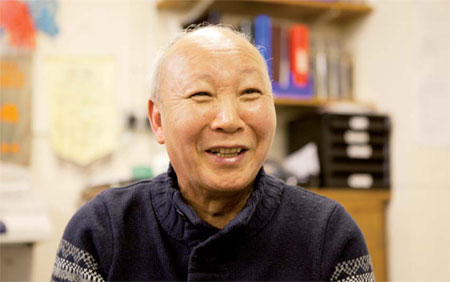Changing Chinatowns
Updated: 2012-11-16 11:10
By Cecily Liu (China Daily)
|
|||||||||||
Finding a voice
|
Li Kui-hsuing is founder of Pagoda Arts, a Chinese community center in Liverpool. Zhang Bin / China Daily |
Despite historically being stereotyped as a 'silent community' due to their lack of visibility in the mainstream society, British Chinese are now playing an increasingly active role in the political arena, in an effort to express issues important to the community.
In 2007, Anna Lo, an immigrant from Hong Kong who arrived in the UK in 1974, was elected to the Northern Ireland Assembly, making her the first elected politician of Chinese origin in Europe.
Lo's success has led to an increasing interest in politics within the Chinese community, and in 2010, an unprecedented number of eight British Chinese candidates stood for election as members of parliament in the British general election.
Although they were unsuccessful, their collective presence has encouraged the British Chinese community to pay more attention to politics.
"There is this idea that Chinese immigrants are not interested in politics," says Joseph Wu, who works with the BC Project, an organization founded in 2006 to promote the integration of British-Chinese into politics.
"It is said that overseas Chinese have an emotional coldness toward politics, but I think this is a very stereotypical idea. From my experience I've found that if people feel that their voice is valued, they will communicate very passionately," he says.
Hoping to better present the Chinese community to the mainstream British audience, the BC Project also conducts training sessions for young Chinese students to understand more about subjects like film production through its BCTV program.
"The older generation did not have so many opportunities. Times are different and many Chinese media organizations are expanding overseas. I would say that the younger generation Chinese are much more lucky," says Tom Hor, a lecturer in media production at the Kingston University and a former British Broadcasting Corporation employee who heads the BCTV lessons.
|
||||
China's strong economic growth has provided overseas Chinese communities with several new opportunities and led to a newfound confidence, says Kiu Hsiung Li, founder of Pagoda Arts.
"When I first came to the UK in 1979, there were very few Chinese on the streets, and most of them worked in restaurants. But nowadays, I see so many young and educated Chinese international students, and I feel so proud of them," he says.
"With China's importance growing, we can now stand up and be very proud to tell everyone that we are Chinese."
Li says that he was lucky to not have had any unfortunate experiences of racism in the UK, but explained that some of the earlier migrants were really looked down upon by the British society. "Some older migrants told me that they often got bullied. In some cases, the customers called them 'China pig'.
During Li's time at Pagoda Arts, he taught music to more than 300 Chinese students, who have moved on to have successful careers as lawyers, doctors and teachers.
"I know that their parents invested heavily in education so that their children could leave the catering trade. With China's rise economically, I'm sure the younger generation of Chinese will have a far brighter future than their parents," he says.
Today's Top News
Rescuers race against time for quake victims
Telecom workers restore links
Coal mine blast kills 18 in Jilin
Intl scholarship puts China on the map
More bird flu patients discharged
Gold loses sheen, but still a safe bet
US 'turns blind eye to human rights'
Telecom workers restore links
Hot Topics
Lunar probe , China growth forecasts, Emission rules get tougher, China seen through 'colored lens', International board,
Editor's Picks

|

|

|

|

|

|









